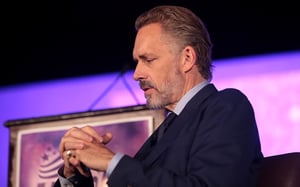Perhaps you have a friend who became your lockdown-era source of “online intelligence” regarding the best new movies on Netflix or the best videos produced by aspiring celebrities.
Reflecting that spirit, but eager to rise above it, I feel duty-bound to bring the good news that a spiritually enriching drama, reflecting and nurturing genuine online intelligence grounded in faith and reason, is “now playing” in the otherwise random world of You Tube. This series, more like an organic, ongoing promulgation of related interviews and presentations, features a protagonist along with his interlocutors, friends, critics, and play-by-play commentators. It constitutes for me what marketers of yesteryear would have called “Must-See TV.”
This content is in-tune with today’s chaotic times of social transformation—and with Catholics’ increasing awareness that, as bishops’ dispensations disappear and our culture’s need for healing grows, now would be a good time to head back to church.
What might this timely, compelling, and edifying content be? It is the return of Jordan B. Peterson, Ph.D., the Canadian psychologist, author, and public intellectual who retreated from computer screens last year. He had built a huge following since the mid-2010s through an immersion in political controversy and an emergence of his secular insights via countless public appearances and online talks. He also produced a best-selling book, 12 Rules for Life: An Antidote to Chaos.
Jordan Peterson Before His Health Crisis in 2019
After provoking new thoughts on an array of topics close to the human heart and spirit, after leaving millions inspired or angry, confounded or curious, and after drawing praise from Bishop Robert Barron for pointing non-believers toward religion, Peterson entered a severe health crisis in 2019.
My Magis Center blog post last June joined in the prayers for his recovery and the praise of his unique role—an “accidental evangelist,” an agnostic scientist craving order and caring about persons. He had been especially successful in telling young people that now would be a good time to find and pursue their missions of ultimate meaning and responsibility to themselves and others. This roadmap toward the sacred steered clear of any stated beliefs about God’s existence.
Peterson’s profound, stoic call to help stem the world’s tendency toward the chaos of evil nudges the “nones,” restless in their competitive, vulnerable positions, to envision an adventure as a champion for the common good. Through the lens of Father Spitzer’s four levels of happiness, this nudge can yield a life-changing crossover from the self-defeating trap of the second level to the greater freedom for sustainable fulfillment found at the third level.
Of course, as Bishop Barron, Father Spitzer, and other Catholic voices point out, such an achievement, which finds too little support in our narcissistic culture, still leaves the individual without the connection to God and transcendent love found at the fourth happiness level.
As an ailing Peterson carried his cross last year, I wondered: Might he return to the public spotlight even more powerful in motivating his fans to cross their bridges when they have come to them—proceeding from a self-absorbed, doubt-plagued culture in two steps, in baby steps, to levels three and four?
Peterson Returns—Has His Health Experience Opened Him to Level 4?
Peterson’s struggles against physical depletion and pain have continued to take a toll, but he reappeared to announce his first phase of recovery and public engagement in a video last October. In 2021, he has resumed making his own podcasts and meeting with some interviewers. He is promoting a new book. In various video contexts, he seems open to more explicit, positive references to personal religiosity and to God as a necessary alternative to atheism—but also as an immensely challenging presence in one’s life.
Now, the thought-leader speaks often of gratitude for an upward trajectory in health and the blessings of charitable support from fans. During a recent “return engagement” with Bishop Barron, he spoke of his wife’s interest in the rosary. When Barron promised his ongoing prayers upon the conclusion of the video—nearly two hours in a conversation of graduate-school caliber—Peterson again expressed thankfulness, a trait he had called close kin to faith: “I need all the blessings from God I can get.”
Among other highlights of that discussion, the psychologist offered advice that continued his role in today’s omnipresent dramas of decathlon-level testing. If the Catholic Church is saying its members must be fully conformed to a Christ of salvific self-giving, he told the Bishop, it is not presenting that awesomely compelling invitation with sufficient urgency. Barron agreed.
Those browsing through You Tube archives of Peterson’s latest videos will find him in agreement with voices such as Father Spitzer, who instructs us (through the release of his Called Out of Darkness books and his EWTN Universe series) to see the plot thickening amid signs of tragic cultural torpor. Both men would align with Barron and many others in saying all people of good will must now discern how the plots of their own lives can become more clarified and energized.
A Culture Desperate for All Four Levels of Happiness
The battles at the borders of all four happiness levels seem to be intensifying. Potential pilgrims who may be stalled at various milestones need reminders to pursue a happiness radically different from social norms of polarization and narcissism; they need to see that, amid their pursuits, beneficial escape routes and bridges to higher levels do exist.
To the degree that our culture takes on post-Christian traits, more of those still frustrated by life at the boundaries of the first three levels may choose a strategy that Peterson deeply fears—no longer seeking the good, not even choosing errors that at least appear to achieve a good, but choosing evil for its own sake. This is a path toward deconstruction, destruction, and even self-destruction. Some may see it, Peterson suggests, almost as a way to punish God (assuming He exists!) for creating the dismal world they perceive. In this scenario, one can imagine those unable to find, define, or imagine true happiness lobbing missiles of demonization, cancellation, and manipulation across the happiness borderlines. That threatens collateral damage to truth, trust, social cohesiveness, and the virtues of faith, hope, and love. Will everything except the community and communion of the fourth level be weaponized?
Fortunately, there is good reason to answer no to this question. Peterson (who does not use Spitzerian models of happiness to develop his scenarios) seems to have adopted, and resumed, his multimedia productivity precisely to keep pushing back against the prospects of darkness and despair in human life. Of course, it is rare to see a smile forming on his face, but he is holding true to his (stoic?) roadmap for meaning and contributive responsibility. He still speaks and writes about steps toward order and bridges toward progress.
Bishops Barron and Holding out Hope
Additional hope emerges from Bishop Barron in the aforementioned video, where he rejects Peterson’s hypothetical about-face toward a scorched-earth battle plan of evil. People inherently pursue what they see, however stupidly, as an apparent good, Barron insists; within this pursuit, God remains present as the ultimate, unconditioned good, ready to invite people out of the worst situations. My interpretation: The “good news” of level four, the Kingdom of God, can make pilgrims’ baby steps joyful and unitive; the whole pathway remains intact, although we Catholics must diligently point toward the best answers.
The 2021 Season of Jordan Peterson
With plot elements such as these, the “2021 season” of Jordan Peterson-linked presentations promises to remain motivational and riveting. Whether or not one agrees with his politics, it is good to see this persistent scholar resuming his long march against chaos. Even better, the broader digital arena will continue to bring us many other voices commenting on, or otherwise illuminating, Peterson’s secular-but-spiritual scripts. (As just one example among many, he discusses politics, post-modernism, digital culture, and faith with biologist Brett Weinstein.)
New dimensions of insight have been added by Peterson’s own via dolorosa. His health perils, concurrent with a worldwide “code blue,” should inspire all of us to continue our pilgrimage toward healing as we carry our respective crosses.
Now would be a good time for us to gather not merely as an audience around our screens, but as brothers and sisters delighted to re-encounter each other—in church pews and in conversations desiring discovery. May our consumption of “online intelligence” encourage us to stay tuned to the panoramic pursuit of true happiness, level by level, person by person, episode by episode.
Cover Image: Gage Skidmore from Peoria, AZ, United States of America, CC BY-SA 2.0
Read Also:
Happiness and the Jordan Peterson Factor
The Greatest Danger Facing America Today According to Bishop Barron

